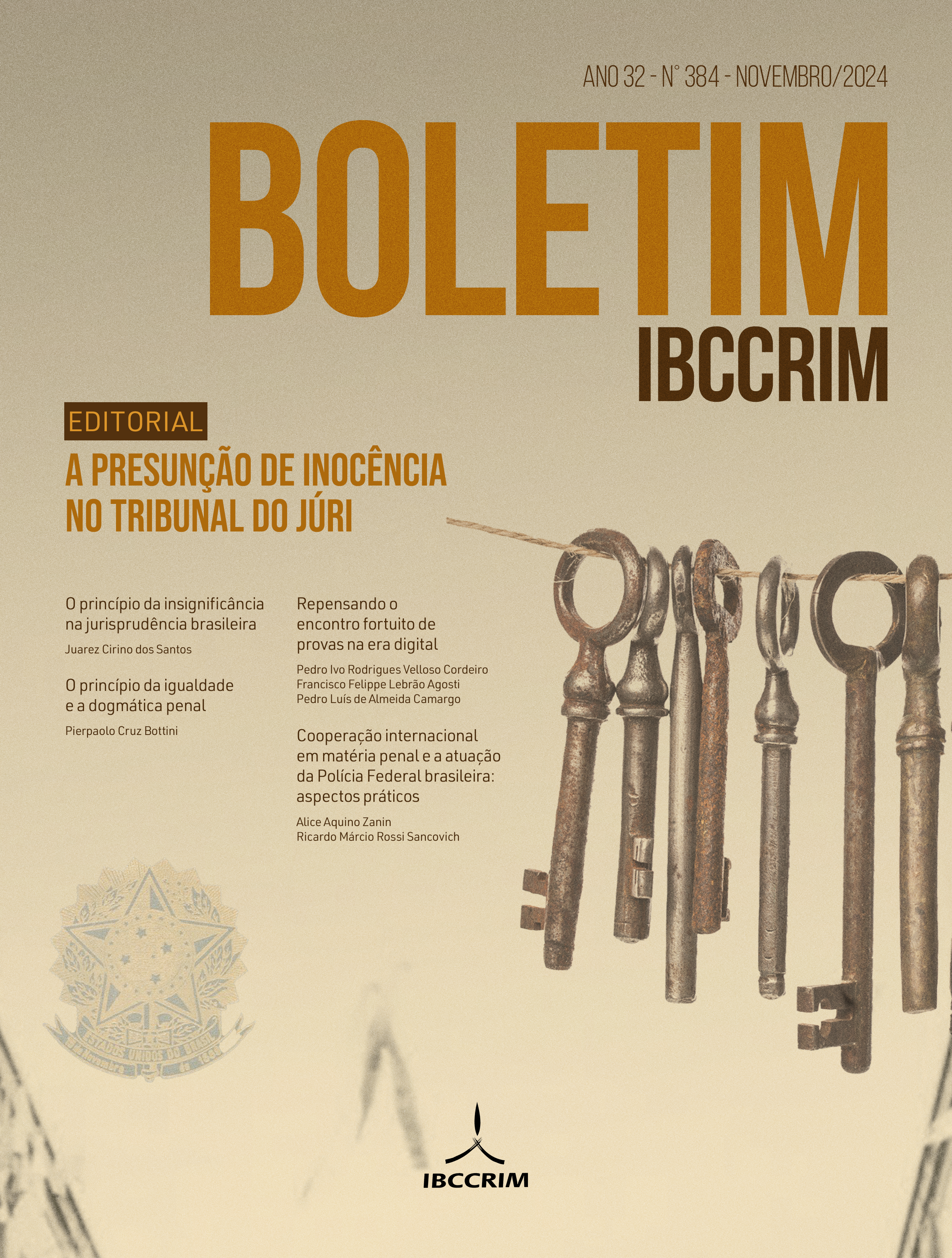Accusatory system, the judge, and evidence:
the problem of investigative powers
Views: 247DOI:
https://doi.org/10.5281/zenodo.13834873Keywords:
criminal process, accusatory principle, evidentiary procedure, judicial impartiality, presumption of innocenceAbstract
This paper analyzes the role of the judge in the Brazilian criminal process, specifically from the perspective of the accusatory principle. The central idea is to explore the limits of the judge’s cognitive procedural activity based on an accusatory structure, highlighting two perspectives: one that advocates for greater probative freedom for the judge, and another that supports limiting the evidence to what is presented by the parties. The study also addresses the implications for judicial impartiality, the presumption of innocence, and other criminal procedural principles.
Downloads
Publication Facts
Reviewer profiles N/A
Author statements
- Academic society
- Instituto Brasileiro de Ciências Criminais
- Publisher
- IBCCRIM
References
BADARÓ, Gustavo Henrique Righi Ivahy. Ônus da prova no processo penal. São Paulo: Revista dos Tribunais, 2003.
BARREIROS, José António. Processo Penal. Coimbra: Almedina, 1981.
BRASIL. Decreto-lei nº 3.689, de 3 de outubro de 1941. Código de Processo Penal. Rio de Janeiro: Presidência da República, 1941. Disponível em: http://www.planalto.gov.br/ccivil_03/decreto-lei/del3689.htm. Acesso em: 16 set. 2024.
CALAMANDREI, Piero. Eles, os juízes, vistos por nós, os advogados. São Paulo: Martins Fontes, 2000.
CORDERO, Franco. Guida alla procedura penale. Túrim: UTET, 1986.
COUTINHO, Jacinto Nelson de Miranda. O papel do juiz no processo penal. In: COUTINHO, Jacinto Nelson de Miranda (Coord.). Crítica à teoria geral do Direito Processual Penal. Rio de Janeiro: Renovar, 2001. p. 3-55.
FERRAJOLI, Luigi. Direito e razão. São Paulo: Revista dos Tribunais, 2014.
GRAU, Eros Roberto. Ensaio e discurso sobre a interpretação/aplicação do direito. São Paulo: Malheiros, 2005.
GRINOVER, Ada Pellegrini. A iniciativa instrutória do juiz no processo penal acusatório. Revista Brasileira de Ciências Criminais, v. 7, n. 27, p. 71-79, 1999.
LOPES JÚNIOR, Aury. Fundamentos do processo penal: introdução crítica. São Paulo: Saraiva, 2022.
MITTERMAYER, Carl Joseph Anton. Tratado da prova em matéria criminal, ou, exposição comparada dos princípios da prova em matéria criminal etc., de suas aplicações diversas na Alemanha, França, Inglaterra etc. Porto Alegre: Bookseller, 1871.
PRADO, Geraldo. Sistema acusatório: a conformidade constitucional das leis processuais penais. Rio de Janeiro: Lumen Juris, 2006.
SOUZA, Artur César de. A parcialidade positiva do juiz. São Paulo: Almedina, 2018.
VIEIRA, Renato Stanziola. Controle da prova penal: obtenção e admissibilidade. São Paulo: Revista dos Tribunais, 2021.
ZAFFARONI, Eugenio Raul. Poder Judiciário: crises acertos e desacertos. Tradução: Juarez Tavares. São Paulo: Revista dos Tribunais, 1995.
ZILLI, Marcos Alexandre Coelho. A iniciativa instrutória do juiz no processo penal. São Paulo: Revista dos Tribunais, 2003.
Downloads
Published
How to Cite
Issue
Section
License

This work is licensed under a Creative Commons Attribution-NonCommercial 4.0 International License.
Copyright of published articles belongs to the author, but with journal rights over the first publication and respecting the one-year exclusivity period. Authors may only use the same results in other publications by clearly indicating this journal as the medium of the original publication. If there is no such indication, it will be considered a situation of self-plagiarism.
Therefore, the reproduction, total or partial, of the articles published here is subject to the express mention of the origin of its publication in this journal, citing the volume and number of this publication. For legal purposes, the source of the original publication must be consigned, in addition to the DOI link for cross-reference (if any).


 Português (Brasil)
Português (Brasil)
 English
English
 Español (España)
Español (España)






